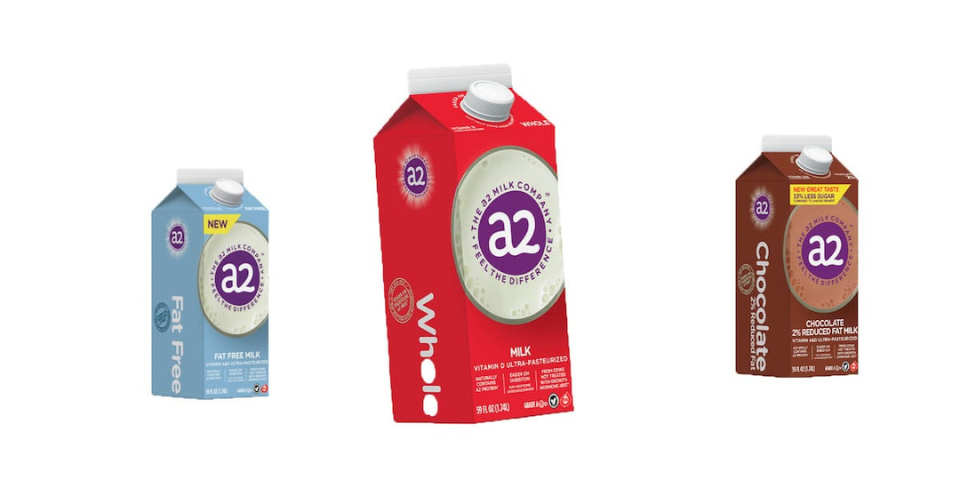Once upon a time, milk came in three options: Whole, low-fat and skim. Maybe chocolate, if you were lucky.
Now, there are seemingly as many varieties of milk as there are bad-for-you breakfast cereals: nut milks, flax milk, oat milk, goat milk. A lesser-known variety you might encounter at the grocery store is A2 milk.
What Is A2 Milk?

A2 milk is cow’s milk that contains predominantly A2 beta-casein, which is purportedly easier for your body to digest and absorb. It’s different from most of the cow’s milk available in the United States, which contains a mix of A2 beta-casein and A1 beta-casein.
First popularized by the New Zealand-based The a2 Milk Company, A2 milk was first sold Down Under in 2003 and has now grown into a $2 billion industry.
According to the company, A2 milk can be found in more than 29,000 retailers across the U.S., including big-box stores like Costco and Walmart. Like regular milk, A2 is available in whole, reduced-fat, and skim varieties.
A1 Milk vs. A2 Milk
The manufacturers of A2 milk claim that A1 beta-casein is difficult for some people to digest and may interfere with maintaining healthy blood sugar levels. (The research is scant on both claims; more on that in a second.)
Casein is the largest group of proteins in milk, comprising about 82 percent of its total protein content. The remaining 18 percent is the more commonly known whey protein. There are 13 different types of casein; A1 and A2 are the most common.
How Is A2 Milk Made, and What Makes It Different?

A2 milk is produced by cows possessing a genetic variation which yields milk that contains A2 beta-casein and lacks A1 beta-casein. Cows that produce milk containing A2 beta-casein are mainly found in Asia, Africa, and part of Southern Europe. Milk from cows in the Western world typically contains A1 beta-casein.
Purported Benefits of A2 Milk
So, does A2 milk have any benefits over regular milk? “It’s difficult to answer that question, since most of the studies regarding A2 milk have been funded by The a2 Milk Company and dairy industry, which have vested interests in demonstrating benefits,” says Dana Hunnes, Ph.D., RD, MPH, senior dietitian at Ronald Reagan UCLA Medical Center.
These are some of the claims that have been made about A2 milk:
1. It’s easier on digestion
A study funded by The a2 Milk Company found that A1 beta-casein takes some people longer to digest, which can lead to indigestion, bloating and gas. A 2019 review of research said that may be true, but human studies are limited and more are needed.
However, in a study conducted by Purdue University, lactose-intolerant participants showed fewer GI symptoms after consuming A2 milk compared to conventional cow’s milk.
2. It promotes healthier blood sugar
According to the California Dairy Research Foundation, since the 1980s, some researchers have made unfounded claims that milk containing A1 beta-casein may contribute to unhealthy blood sugar levels and even compromised cardiovascular function.
The alleged culprit: BCM-7, an amino acid chain that is produced when A1 beta-casein is digested. The theory is that BCM-7 can cause illness in people with immune deficiencies. But there’s no scientific evidence in humans to back this up.
Possible Risks of A2 Milk

The risks associated with A2 milk are little different than those associated with most cow’s milk.
Lactose intolerance
A2 milk contains the same amount of lactose as regular cow’s milk. People who have been diagnosed with lactose intolerance may suffer the same digestive upset when drinking either type of milk.
Allergies
Because A2 milk is still cow’s milk, it can elicit an allergic reaction in people who are allergic to cow’s milk.

